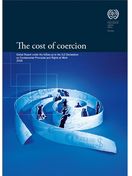Elimination of all forms of forced or compulsory labour



ILO Conventions |
|---|
Economic circumstances can compel people to barter away their freedom, and labour exploitation can occur in many forms. But forced labour (to use a short comprehensive term) is something quite distinct. It occurs where work or service is exacted by the State or individuals who have the will and power to threaten workers with severe deprivations, such as withholding food or land or wages, physical violence or sexual abuse, restricting peoples' movements or locking them up.
For example, a domestic worker is in a forced labour situation where the head of a household takes away identity papers, forbids the worker to go outside and threatens him or her with, for instance, beatings or non-payment of salary in case of disobedience. The domestic may also work for an unbearably low wage, but that is another matter. If he or she were free to leave, this would not amount to forced labour - but to exploitation.
Another example of forced labour arises where villagers, whether they want to or not, have to provide substantial help in the construction of roads, the digging of irrigation channels, etc., and where government administrators, police officers or traditional chiefs brandish a credible menace if the requisitioned men, women or children do not turn up.
Bonding workers through debts is, in fact, a widespread form of forced labour in a number of developing countries. Sometimes it originates with a poor and illiterate peasant pledging labour services to an intermediary or a landowner to work off a debt over a period of time. Sometimes the obligation is passed on from one family member to another, even down to children, and from one generation to another. The labour service is rarely defined or limited in duration, and it tends to be manipulated in such a way that it does not pay off the debt. The worker becomes dependent on the intermediary or on the landowner and labours in slave-like conditions. The threat and, indeed, the occurrence of violence or other penalties for failing to work turns an economic relationship - one-sided as it is to start with - into a forced labour situation.
Labour trafficking can give rise to forced labour. One way in which traffickers tend to put themselves into a threatening position is to confiscate the identity papers of the person they move for employment purposes. Another is to entrap their charges through cash advances or loans. Traffickers may also resort to kidnapping, notably of children. At any rate, traffickers, the persons linked to them or the employers at the point of destination give their victims no choice as to what work to perform and under which conditions. Intimidation can range from revealing the victim's illegal status to the police, to physical assault and sexual abuse.
The ILO Declaration on Fundamental Principles and Rights at Work obliges member States to eliminate forced labour. A work relationship should be freely chosen and free from threats.
Countries may have definitions of forced labour that are more comprehensive than the ILO's. The ILO sets minimum standards that fix the bottom line below which individual countries should not fall, but they can naturally achieve higher standards of protection of workers.
